The Bagpipe Society
"The Journey of Askavlos" - an ethnomusicological docuemntary
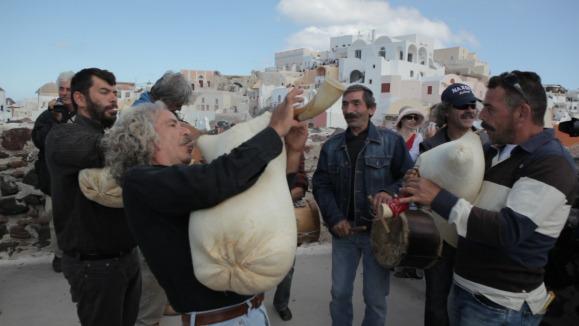
Vassilis Psaras(ntoumpaki), Giannis Manios(tsampouna)
What is this film about? Tell us a few words about it.
This film is about an ancient instrument, called the Askavlos. This comes from the Greek words askos + avlos and means bag + pipe. And about how it is being revived today by a community that is trying to preserve it and pass it on to future generations. Along with this community there are young musicians who are not only trying to revive it but are incorporating this instrument into the contemporary music scene in Greece and worldwide. To me this is the Journey of an instrument that comes from the distant past and passes on and hopefully will be incorporated into the world of traditional and contemporary music for a long time to come.
Why did you make this film?
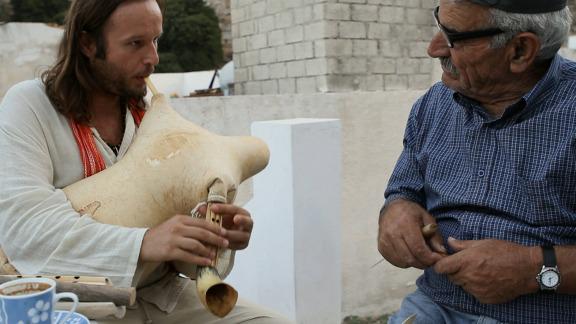
I made this film to show the world that in this geographical area of the Aegean Sea, there is a group of people who are in love with this instrument and its ancient tradition, and they are crazy about preserving this tradition and trying to pass it on to the next generations. I discovered with them a world that fascinates me to this day. The Askavlos (bagpipe in Greek) is like a magic flute for me, from the moment I first heard it, I was enchanted.
How did you start with the idea?
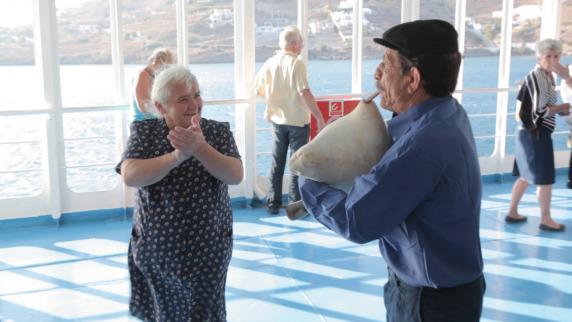
At the time I was working with Yannis Pantazis in the same bar, me as a bartender and him as a musician in the band, to make some money while we were studying. And since then, we have become very good friends. After our studies, he went to Santorini and I went to Hamburg, but we kept in touch and talked now and then.
A few years later, I visited him in Santorini and he told me about his new love, the tsampouna, the Greek bagpipe of the Aegean. Yannis was playing saxophone and harmonica at the time. I asked him how things were going. He told me that he was looking for bagpipes on all the Aegean islands, while trying to find people who played the instrument, to learn from them old songs and how this ancient bagpipe was played and made. He took out of a plastic bag another bag made of goatskin and played the bagpipe in front of me. Anyone who has ever heard this instrument live knows about that feeling of how this instrument mesmerizes you. The resonance of the sound is amazing. So that’s how the bagpipe impressed me too! This project started in 2010, where I wanted to make a portrait of a young contemporary musician, influenced by jazz and blues, who was impressed by a primitive traditional instrument. And in his quest to find this instrument, he discovers old musicians from the Aegean islands.
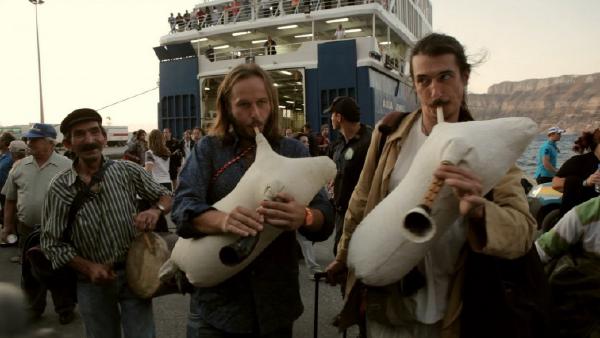
So, I started researching about this topic and collecting information, designing this project. At that time Yannis told me about an annual meeting of bagpipers organized by the prefecture of the southern Cyclades. Then I realized that Yannis was not alone in this, but there were many people, young and old, who were trying to preserve this old tradition. He also told me that the next meeting would be in Santorini.
I decided to put together a crew, friends who were film professionals, to go there and cover this event. Having them all in the same place made it very easy to interview the bagpipers I was interested in while doing my research. All of these musicians and the organisers embraced me in a way that made me feel like family.
After this event was over, I returned to Germany and started planning the project. I realised that it was becoming bigger than I first thought and that I was going to make a film about a community trying to save an ancient tradition from being lost. The fact that I was now one of them committed me to keep trying to tell their story. It became an obsession, because every year when the event was announced I would organize everything to be there with my crew and gather the footage I thought I needed.
Why did it take ten years to finish this project?
At the beginning I was very idealistic! It was my first feature film, so I underestimated some things, like finding money for development and production. The only thing I had in my mind was the idea and how it could be made into a film. At first, I paid for everything out of my own money. I managed to work for a few months so I could get some money for the production. I thought this would be an amazing project that everyone would want to support. I was very optimistic about it. I was wrong. From 2011 to 2020 I was trying find and convince possible financiers, Greek and German production companies, the Greek state film financing, that this project was worth investing in. In the end, I had to do it on my own, without any support from anyone. I financed it entirely by myself. I was armed with absolute stubbornness, since my origins are from Epirus in Greece. And this is something common there, perhaps because we are used to overcoming any difficulties, living in a mountainous environment. Every difficulty made me more persistent. As this production reached its completion in March 2020, the pandemic began. The only people who believed in this project were those who worked with me. This was especially the case with the editor, Chronis Theocharis, who is very experienced in editing and literally saved this project at a time when I was desperate and had no energy to continue. Even though he was very busy editing two or three projects at the same time, he was willing to help. After all those years of filming, I had over 140 hours of footage. That was the time to have someone to organise and sync all of this stuff together and have the experience to take the right steps creating the optimal environment for the final edit. This editing process lasted 3 years, where two or three times a year I would go to Petralona in Athens, where Chronis lives and works, in order to move to the next phase of editing each time. I learned a lot from him about creative documentary filmmaking because of the editing process.
What has been the reaction to the film since its release and has it achieved its aim of increasing knowledge of the instrument and the culture?
The film has so far done extremely well at festivals with over 15 nominations and three awards at festivals in Greece and abroad (Europe, America and Asia). The reaction and the reviews I’m getting are praising the result, something I’m particularly proud of. I think it gives a comprehensive picture of the revival that has taken place around traditional music and the instrument. Someone who has come to the cinema without knowing anything about the existence of the bagpipe in Greece comes out of the cinema full of relevant images and melodies.
Are you still in touch with some of the people featured in the film? Have they seen the film?
I have established deep friendships with most of the people involved in the film. I met them about ten years ago, but in the years that followed I met them every year at the Pancykladic meetings. I also keep them informed about the film’s whereabouts at various festivals through social media. It is very nice that a community has been created around the film that follows its development. Most people have seen the film, either in person or online. We had three screenings in cinemas in Athens and one in Thessaloniki last September. The Greek festivals in 2021 that were organized online offered online screenings. A series of screenings in summer cinemas on the Aegean islands are being organised in the summer through CineDoc Greece.
What motivates you as a filmmaker? Why do you make documentaries or films?
What drives me to make films is passion. I wouldn’t have struggled for about ten years to make this film if I didn’t have a passion. I also made this film based on the passion of the characters, how they wanted this revival. I also want to communicate and I’m trying to explore my boundaries. I’m interested in human stories with a universal meaning. Although I am not a musician, I am fascinated by music. I would like to do more musicological films.
Do you have something in mind for a next project?
Yes, I’m working on an idea right now for a next project. But it’s too early to say anything. I would also like to make a fiction film. I additionally have a few more ideas I’d like to implement, but for now I’m focusing on how I’m going to distribute The Journey of Askavlos.
How can we watch The Journey of Askavlos?
The European channel Arte tv (Germany, France, Switzerland, Austria, Germany, France) will show the film in the summer and will make it available on their platform. The film is already offered on VOD by CINEDOC’s channel, as part of Greece in a Box, with no geographical limitation. On Greek TV it will be shown successively on the COSMOTE HISTORY channel, starting in March. Soon one will be able to buy a screening with a link and from the official internet page: https://thejourneyofaskavlos.com/ where one can get all the information about the film.
https://vimeo.com/thejourneyofaskavlos/trailer The film can be hired via this link https://vimeo.com/ondemand/thejourneyofaskavlos
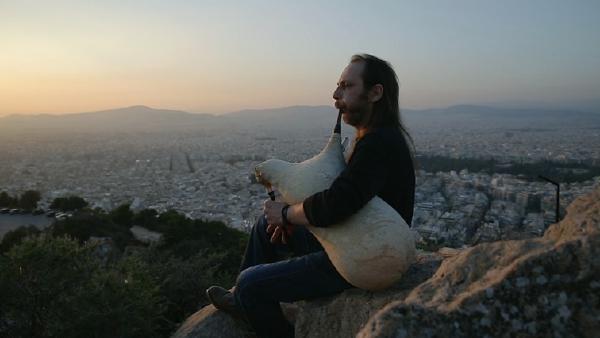
By Arvanitis, Yorgos Trad Various
From Chanter Summer 2022.
- Data Processing Notice (GDPR)
-
@BagpipeSociety on X (formally known as Twitter)
-
TheBagpipeSociety on Instagram
-
 BagpipeSociety on Facebook
BagpipeSociety on Facebook
Something wrong or missing from this page? Let us know!
